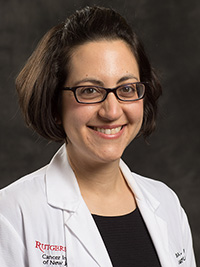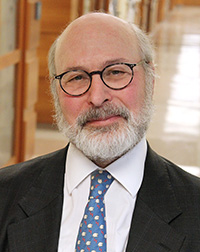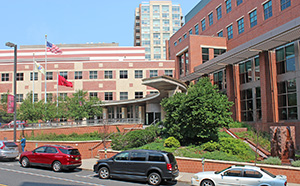April 1, 2019:
Investigator Spotlight
Salma Jabbour, MD, Rutgers Cancer Institute of New Jersey
Educational background

- BA, University of Virginia
- MD, University of Maryland School of Medicine
- Internship, University of Maryland Medical Center
- Residency in Radiation Oncology, Johns Hopkins School of Medicine
Research interests
I am interested in developing novel therapies for the treatment of lung cancers and gastrointestinal cancers in combination with radiation therapy. Many of these diseases still require significant improvements in outcomes, and breakthroughs such as immunotherapy may help patients live longer and control their cancers when combined with radiation therapy. By working together with my colleagues at Rutgers, the Big Ten Cancer Research Consortium, and other collaborators, we can learn about how radiation therapy combined with new medicines can potentially improve the lives of patients. Both the thoracic and gastrointestinal groups in the Big Ten CRC have cutting-edge trials to extend the benefits of new combinations of agents to patients to make progress in fighting cancer. I am hopeful that incorporating radiation treatment with immunotherapy will increase cure rates.
Little-known facts about Dr. Jabbour
- Harry Potter’s magical tendencies would be very helpful for certain projects such as traveling to conferences. Just take the broom and forget the airplane!
- Vacations are best when they involve water activities, particularly watching the waves splash onto the sandy beach.
- Once we cure cancer, I’d love to start a second career as a high school math teacher.
Thought Leader Perspectives
Howard S. Hochster, MD, FACP, Associate Director for Clinical Research and Director, Gastrointestinal Oncology, Rutgers Cancer Institute of New Jersey; and Director of Oncology Research, RWJBarnabas Health.
 As our state’s only National Cancer Institute-designated Comprehensive Cancer Center, Rutgers Cancer Institute of New Jersey is at the forefront of cancer research, treatment, prevention and education. With more than 25 years of providing patient care for adults and children, we deliver high-quality services through an integrated care model with RWJBarnabas Health – driven in part by investigator-initiated scientific exploration. This partnership enables us to provide patients with greater access to the most sophisticated treatment options close to home.
As our state’s only National Cancer Institute-designated Comprehensive Cancer Center, Rutgers Cancer Institute of New Jersey is at the forefront of cancer research, treatment, prevention and education. With more than 25 years of providing patient care for adults and children, we deliver high-quality services through an integrated care model with RWJBarnabas Health – driven in part by investigator-initiated scientific exploration. This partnership enables us to provide patients with greater access to the most sophisticated treatment options close to home.
This includes the offering of CAR-T cell therapy in conjunction with Robert Wood Johnson University Hospital New Brunswick, an RWJBarnabas Health facility. As this treatment is not yet widely available, we are pleased to add CAR-T cell therapy to our arsenal for patients with B-cell lymphomas who may have had limited treatment options prior to the treatment’s recent approval. We are also the only site in the state offering an important new therapy for neuroendocrine tumors (NETs) using Peptide Receptor Radionuclide Therapy (PRRT) with lutetium Lu 177 dotatate.
Investigators anticipate accelerated progress in further understanding this immunotherapy approach and how it may be applied to other types of cancer – including solid tumors. At Rutgers Cancer Institute, we are committed to advancing this knowledge by driving research aimed at improving efficacy and reducing toxicity for the next generation of CAR-T cell therapies. A clinical trial with CAR-T for intraperitoneal adenocarcinoma will open soon in conjunction with our cytoreductive surgery (CRS) efforts (see below).
By collaborating on clinical trials and exploring novel therapies with the Big Ten Cancer Research Consortium and others, we have an opportunity to enhance patient care. For example, Rutgers Cancer Institute’s Dr. Jyoti Malhotra is the lead investigator on a Phase 1 clinical trial (BTCRC-LUN17-127) examining a novel immunotherapy combination for small cell lung cancer. While not as common as non-small cell lung cancer, small cell lung cancer can be aggressive and does not often present in patients until it is advanced, thus resulting in the potential for a lower response rate when patients are treated with standard therapy. We are also collaborating with other lead Big Ten CRC investigators in six other clinical trials for various tumor types. Through collaborations such as this, we are able to translate scientific outcomes into anti-cancer therapies that can provide additional treatment options for patients. We are able to accomplish this more rapidly thanks to shared patient populations, protocols and data among highly regarded research universities and their cancer centers.
 Along with clinical trial development and access, technological and surgical advances are also important in reducing the cancer burden. Rutgers Cancer Institute in concert with Robert Wood Johnson University Hospital is one of only two locations in New Jersey to offer proton therapy and we are also one of only two centers in our state to offer bone marrow/stem cell transplants. Our facilities offer unique surgical expertise in the treatment of mesothelioma, ovarian cancer and abdominal cavity cancers through a procedure involving surgery and a form of heated chemotherapy – CRS/HIPEC – a treatment not widely available. And while more commonplace, robotic forms of surgery for urologic and gynecologic malignancies are part of a comprehensive range of treatment options for our patients.
Along with clinical trial development and access, technological and surgical advances are also important in reducing the cancer burden. Rutgers Cancer Institute in concert with Robert Wood Johnson University Hospital is one of only two locations in New Jersey to offer proton therapy and we are also one of only two centers in our state to offer bone marrow/stem cell transplants. Our facilities offer unique surgical expertise in the treatment of mesothelioma, ovarian cancer and abdominal cavity cancers through a procedure involving surgery and a form of heated chemotherapy – CRS/HIPEC – a treatment not widely available. And while more commonplace, robotic forms of surgery for urologic and gynecologic malignancies are part of a comprehensive range of treatment options for our patients.
Along with RWJBarnabas Health, the Big Ten Cancer Research Consortium and others, Rutgers Cancer Institute of New Jersey continues to develop and drive collaborative opportunities focused on integrated care and the science that propels advances to reduce cancer mortality and improve health outcomes.
About the Big Ten Cancer Research Consortium: The Big Ten Cancer Research Consortium was created in 2013 to transform the conduct of cancer research through collaborative, hypothesis-driven, highly translational oncology trials that leverage the scientific and clinical expertise of Big Ten universities. The goal of the Big Ten Cancer Research Consortium is to create a unique team-research culture to drive science rapidly from ideas to new approaches to cancer treatment. Within this innovative environment, today’s research leaders collaborate with and mentor the research leaders of tomorrow with the unified goal of improving the lives of all patients with cancer.
About the Big Ten Conference: The Big Ten Conference is an association of world-class universities whose member institutions share a common mission of research, graduate, professional and undergraduate teaching and public service. Founded in 1896, the Big Ten has sustained a comprehensive set of shared practices and policies that enforce the priority of academics in the lives of students competing in intercollegiate athletics and emphasize the values of integrity, fairness and competitiveness. The broad-based programs of the 14 Big Ten institutions will provide over $200 million in direct financial support to almost 9,500 students for more than 11,000 participation opportunities on 350 teams in 42 different sports. The Big Ten sponsors 28 official conference sports, 14 for men and 14 for women, including the addition of men’s ice hockey and men’s and women’s lacrosse since 2013. For more information, visit www.bigten.org.














Subscribe to the Big Ten CRC Newsletter X
X Facebook
Facebook YouTube
YouTube